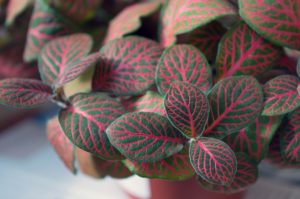I was raised in a home where my Mom had a beautiful garden and she always had a house full of plants. So growing houseplants has never been intimidating for me. I have many customers who come into the shop asking us questions about their plants, many of whom have died or are dying, so I thought it best if I could summarize a few basic tips on growing tropical houseplants in your home.

1/ Watering
Most plants require a good drink of water once a week. A good drink means probably about 1/3 of the flower pot size. So if I have a plant in a 6-inch pot, I would give it the equivalent of 2 to 3 cups of water once a week. This encourages the roots of your plant to spread out into the soil, creating a healthy root system that spreads through the whole pot. Giving the plant frequent, small amounts of water causes the plant to develop small insignificant roots that stay on the surface of the soil.
If you have a water softener do not use that water to water your plants. Likewise, you should not use distilled water for your plants. Houseplants require minerals in our water and not excessive salt (from water softener salts). I use tap water but fill my watering can 24 hours in advance of watering. Letting it stand for that time period dechlorinates tap water, plus the temperature becomes tepid (at room temperature) which your plants will enjoy, as opposed to being shocked with extremely cold water.
2/ Fertilizing
During the winter months, I do not fertilize my plants as they are not actively growing. I begin to introduce fertilizer during February/March while we are getting more sunlight. 20.20.20 fertilizer gives the plants a good balance of requirements and I usually only fertilize every 4 weeks or so.
3/ Damaged Leaves
If your houseplant has broken or browning leaves it is best to snip off the whole damaged leaf because your plant will spend a lot of its energy trying to heal the leaf. This is energy best spent contributing to the remaining healthy plant.
4/ Light
Research the variety of plant you own to determine the amount of light that it requires. Some plants do well in low light conditions while others need more light. Again, seasonal changes offer different light conditions, so while the sun is hotter in the summer months you will probably have to place your plant further away from your window. This is especially true with south and west facing windows. It is best to rotate your plants regularly to avoid heavier growth on side of your plant, plus it creates a healthier stronger plant with even growth on all sides.
These are a few basic guidelines that I can offer for houseplant care. Have fun with your plants and enjoy a healthy living environment by including plants in your home.
Nasa completed a really interesting Clean Air Study view it here